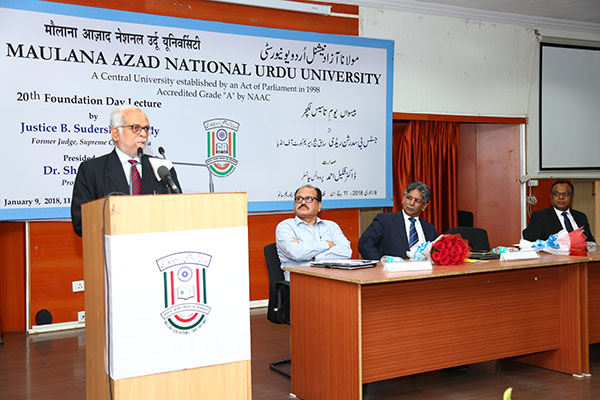Hyderabad: Historically, the denial of access to education was the key factor in construction of hierarchical society in India that denied the humanity to those excluded and inflicted untold harms upon them ‘because they were deemed lesser by the elite’, said Justice B. Sudershan Reddy, former judge of Supreme Court, on January 9.
Delivering the 20th Foundation Lecture at Maulana Azad National Urdu University, Justice Sudershan Reddy said that the society as such has failed in undoing the historical injustices, particularly in providing quality education to those who are at the lower strata of the society.
“On a personal front I must confess to a deep sense of lack of emotional fulfillment of my own tasks as a human being and as an Indian who was bestowed the blessing of education. The dehumanization of others that is implied in keeping them shackled by ignorance has to be necessarily a mark of my own dehumanization,” he said to the large gathering of students and staff at the Directorate of Distance Education auditorium.
Parliament passed an Act on the formation of MANUU in 1996. It was taken forward by establishing it in Hyderabad in 1998.
The function was presided over by Dr. Shakeel Ahmad, Pro Vice-Chancellor, who spoke about the targets the University has set for itself. Dr. M. A. Sikandar, Registrar, presented a memento to the guest.
Justice Reddy quoted Article 38 which says that the State shall strive to promote the welfare of the people by securing and protecting a social order in which justice (social, economic and political) shall inform all the institutions of the national life. It also said that the State shall strive to minimise the inequalities in income, status, facilities and opportunities among individual and groups of people.
He said that one of the purposes of education is to train individuals to become socially and economically productive members of the society. The other goal is to train individuals to become full participants in the democratic discourse. “A democracy is not just about periodic elections and the winning of this group or that the right to wield collective power…Its chief function is to structure reasoned and reasonable debate amongst all citizens…to give shape to collective aspirations.”, he said.

